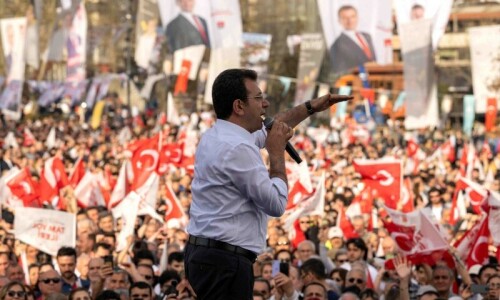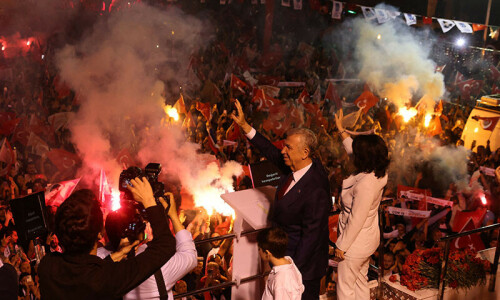ISTANBUL: Turks dealt President Tayyip Erdogan and his party their biggest electoral blow in a nationwide local vote that reasserted the opposition as a political force and reinforced Istanbul Mayor Ekrem Imamoglu as the president’s chief rival.
With most of the votes counted, Imamoglu led by 10 percentage points in the mayoral race in Istanbul, Turkiye’s largest city, while his Republican People’s Party (CHP) retained Ankara and gained 15 other mayoral seats in cities nationwide.
It marked the worst defeat for Erdogan and his AK Party (AKP) in their more than two decades in power, and could signal a change in the country’s divided political landscape.
Erdogan called it a “turning point” in a post-midnight address. He and the AKP fared worse than opinion polls predicted due to soaring inflation, dissatisfied Islamist voters and, in Istanbul, Imamoglu’s appeal beyond CHP’s secular base, analysts said.
In post-election address, president calls it a ‘turning point’
“Those who do not understand the nation’s message will eventually lose,” Imamoglu, 53, told thousands of jubilant supporters, some of them chanting for Erdogan to resign.
“Tonight, 16 million Istanbul citizens sent a message to both our rivals and the president,” said the former businessman, who entered politics in 2008 and is now widely touted as a likely presidential challenger.
Erdogan, who in the 1990s was also mayor of his hometown Istanbul, had campaigned hard ahead of the municipal elections, which analysts described as a gauge of both his support and the opposition’s durability.
Addressing crowds gathered at AKP headquarters in Ankara, Erdogan said his alliance had “lost altitude” across the nation and will take steps to address the message from voters. “If we made a mistake, we will fix it” in the years ahead, he said.
“If we have anything missing, we will complete it.”
Elsewhere in Ankara, thousands more supporters had earlier waved Turkish and party flags for a speech by reelected CHP Mayor Mansur Yavas, who trounced his AKP challenger in another disappointment for Erdogan.
According to 92.92pc of ballot boxes opened in Istanbul, Europe’s largest city and the country’s economic engine, Imamoglu had 50.92pc support compared with 40.05pc for AKP challenger Murat Kurum, a former minister in Erdogan’s national government.
Polls had predicted a tight contest in Istanbul and possible CHP losses across the country.
Yet partial official results reported by state-run Anadolu Agency showed AKP and its main ally giving up mayoralties in 19 key municipalities including big cities Bursa and Balikesir in the industrialised northwest, possibly reflecting strains on wage earners.
The CHP led nationwide by almost 1pc of the votes, a first in 35 years, the results showed.
Mert Arslanalp, assistant professor of political science at Istanbul’s Bogazici University, said it was Erdogan’s “severest election defeat” since coming to national power in 2002.
“Imamoglu demonstrated he could reach across the deep socio-political divisions that define Turkiye’s opposition electorate even without their institutional support,” he said. “This makes him the most politically competitive rival to Erdogan’s regime.”
Imamoglu’s rise
In 2019, Imamoglu had dealt Erdogan a sharp electoral blow when he first won Istanbul, ending 25 years of rule in the city by AKP and its Islamist predecessors, including Erdogan’s own run as its mayor in the 1990s. CHP also won Ankara that year.
The president struck back in 2023 by securing reelection and a parliamentary majority with his nationalist allies, despite a cost-of-living crisis.
Analysts said the economic strains, including nearly 70pc inflation and a slowdown in growth brought on by an aggressive monetary-tightening regime, moved voters to punish AKP this time.
“The economy was the decisive factor,” said Hakan Akbas, a senior adviser at the Albright Stonebridge Group. “Turkish people demanded change and Imamoglu is now the default nemesis to President Erdogan.” Erdogan said ending the second election cycle in less than a year will itself bring a reprive for the economy.
In front of the Istanbul Municipality building, flag-waving supporters said they wanted to see Imamoglu challenge Erdogan for the presidency.
Rising popular support for the Islamist New Welfare Party, which took an even more hardline stance than Erdogan against Israel over the Gaza conflict, also sapped AKP support. Imamoglu was reelected despite the collapse of the opposition alliance that failed to topple Erdogan last year. The results suggest many Kurds put aside party loyalty and voted for him again.
Published in Dawn, April 2nd, 2024
















































Dear visitor, the comments section is undergoing an overhaul and will return soon.